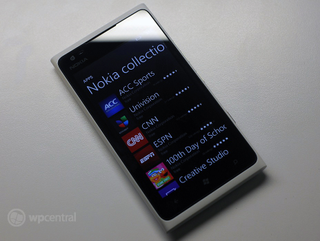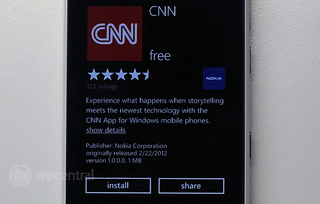Is Nokia causing fragmentation on Windows Phone with their exclusive apps? Nope.
Nokia has made moves to gain some big titles (and leverage) for their hardware. Who does it hurt? Who does it benefit and is it a good thing?


With yesterday’s announcement from Nokia describing a planned set of “exclusive” apps and even more games for their Lumia line of Windows Phones (and presumably anything else they have up their sleeve), Nokia has won both praise and some scorn for their bold move.
The concern, as echoed by some in the tech press, is that Nokia’s move will cause that dreaded “F word” to happen. No, no that one, the other one – fragmentation.
Fragmentation is the boogey word of the year due almost entirely to Google and their Android OS. But as ex-Microsoftie Charlie Kindel astutely pointed out, there isn’t just one type of fragmentation. Rather, there’s at least six ways you can divide up the terms with some of it being positive and some of it negative, affecting consumers or developers. Point is, they're not the same and what is causing problems for Android is not the same as what Nokia is doing.
The real question is, will Nokia’s strategy to get these apps and games on their hardware hurt Windows Phone? We say “no” and here’s why.
The Reality
First, let’s not kid ourselves: Windows Phone OS currently garners about 2% of the mobile OS market. Sure it has the world ahead of it and the potential for it to explode at any moment is real but it’s going to be quite some time before we start to see headlines akin to “Microsoft catching up to Android”.
In other words, Microsoft and Windows Phone have much bigger problems in front of them, like getting noticed, picking up those “must have apps” and getting phones into customer hands, a lot of hands.
Fragmentation, which ever type you’re referring to, is a concern when your platform gets so big and successful that you have nothing else to really worry about. Or at the very least, something that hinders growth and adoption. It’s a luxury that Android users have this problem and it’s only relevant because Android is so massive. Yet despite all the talk of negative fragmentation, it hasn't made a dent in Android sales so far.
Get the Windows Central Newsletter
All the latest news, reviews, and guides for Windows and Xbox diehards.
With less than 2% of the mobile OS market, there’s really nothing to fragment -- harsh, yes but that’s the truth.
Will Nokia’s move hurt Windows Phone partners HTC and Samsung?
If Nokia keeps getting all of these exclusive apps and games, will it hurt HTC and Samsung’s efforts? That’s a good question and yes, the potential is certainly there. After all, Nokia’s move is as much to grow the platform as it is to best their competitors.
Still, HTC and Samsung don’t have to sit idly by. In fact, in the last two years either one could have done what Nokia are doing now but they didn’t. Currently we have a few interesting OEM apps from Samsung and HTC but they didn’t throw their weight around to try and ignite the OS, they left that to Microsoft and their wallet.
What’s to stop HTC and Samsung from doing the same? They probably didn’t want to invest any more money into the ecosystem or perhaps they underestimated how long it would take for Windows Phone to take off. Or maybe they were just cheap. All we know is they didn’t pick this path and Nokia has so it seems odd to penalize Nokia for their admittedly audacious decision.

Nokia: Taking one for the team?
What about developers?
Here’s is where one of Android’s fragmentation situations arises. With all the varying degrees of hardware, custom UIs, resolutions and changing SDKs developing on Android is not as smooth as Windows Phone.
As far as we can see, Nokia’s move to garner exclusive apps for the Lumia line has ZERO impact on developers – quite the contrary, in fact.
Nokia’s move will accelerate Windows Phone adoption. Mostly for their hardware but once consumers start buying Nokia phones, the OS will grow and developers will have even more incentive to develop, not less. We’ve already seen that happen in the last few months. (And we’ve heard nothing but great things from devs who’ve worked with Nokia directly).
Nokia just lit the fuse to a potential powder keg to get this OS moving. That benefits everyone, even Samsung and HTC. Eventually.
Will Nokia’s apps hurt Windows Phone consumers or just their feelings?
Not directly, though we could imagine some HTC and Samsung Windows Phone owners sighing with disgust every time we announce a new Nokia-exclusive game or app. That’s fair.
The message is clear: if you want the best Windows Phone experience, go with a Nokia phone. Is that a bad thing? Well, if Nokia wasn’t making some of the most interesting, best looking and talked about Windows Phones to date, we’d say yes. (Imagine if LG was doing this and you had to buy a ‘Fantasy’!).
But Nokia is the one OEM here who is putting everything on the line with Microsoft and this OS. Literally. There is no plan ‘B’ for them. Their hardware is distinct and if they want to take the lead for the OS and design, we’re actually okay with that.
Sure that’s biased and unfair but does anyone really think HTC and Samsung are going to “hero” this OS?
Some will say that Nokia should just make these apps available to everyone right away, you know, basically eat the costs of making these software deals. To us that sounds ludicrous. And if you owned Nokia stock it would be an odd decision to champion as Nokia should get some advantage, albeit temporary, for taking the risks they are with Windows Phone.
If all of a sudden Samsung and HTC started playing the same “exclusive” game as Nokia, that would admittedly be frustrating; but we see no indication that such a path will be chosen by either company now or in the future.
So who does win?
The consumers do, of course. Windows Phone is finally getting an OEM that it deserves, one who is grabbing these companies by the lapels and getting these most-wanted apps made.
Paypal, Rovio, ESPN, Groupon, Time Magazine, Newsweek, CNN, etc. all could have made some of the most cutting edge Windows Phone apps out there in the past. We’re sure Microsoft would have lent developer support as they always do and the apps would be regularly featured in the Windows Phone Marketplace.
That didn’t happen. Face it, the only reason we’re getting these apps is because Nokia did whatever it is they did to get these companies to the table.
The choice comes down to no one having these apps or Nokia having them (at least, temporarily) and if that is the choice, we’ll take the latter -- Windows Phone OS needs the boost. We’ll be the first to admit technically it’s “unfair” but as we mentioned earlier, Windows Phone doesn’t have the luxury to worry about exclusive-app fragmentation right now.
We need to propagate the OS, the ecosystem and the user base by any means necessary, because with the current adoption rates and RIMs BlackBerry 10 looming this fall, competition will only get more fierce (even if we think RIM is DOA).
We do lament that it has to come to one OEM leading the charge for Windows Phone app development, no argument there from us. It would have been better if these apps were just available to everyone but if that were the case, we probably wouldn’t be talking about disquieting marking share, would we?
Bottom line: we don't see Nokia's potential "fragmentation" as being a negative value. Instead, it's positive as it won't hinder the growth and adoption of the OS, which is the only type of fragmentation we should be concerned about. We expect the opposite effect: Nokia will continue to spur growth and adoption of Windows Phone and we're okay with that.

Daniel Rubino is the Editor-in-chief of Windows Central. He is also the head reviewer, podcast co-host, and analyst. He has been covering Microsoft since 2007, when this site was called WMExperts (and later Windows Phone Central). His interests include Windows, laptops, next-gen computing, and watches. He has been reviewing laptops since 2015 and is particularly fond of 2-in-1 convertibles, ARM processors, new form factors, and thin-and-light PCs. Before all this tech stuff, he worked on a Ph.D. in linguistics, watched people sleep (for medical purposes!), and ran the projectors at movie theaters because it was fun.
